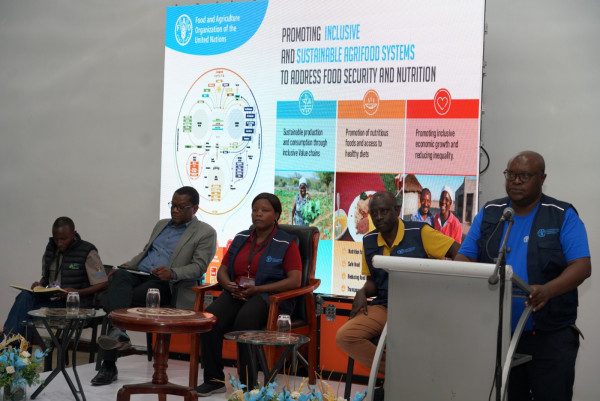The Food and Agriculture Organization of the United Nations (FAO) and Zimbabwe team up to transform agriculture with innovative approach to sustainable agrifood systems

The Food and Agriculture Organization of the United Nations is supporting the transformation of Zimbabwe’s agricultural sector, setting a bold vision for food security and economic resilience by 2030. The ambitious strategy combines government commitment, international support, and innovative approaches to address the complex challenges facing the nation’s food systems.
“We cannot have a better opportunity to discuss the importance of sustainable, resilient and inclusive agri-food systems,” explained the Deputy FAO representative in Zimbabwe, Louis Muhigirwa, highlighting the critical nature of this transformative approach. The initiative comes against a backdrop of multiple global crises, including climate change, economic instability, and geopolitical tensions.
The government’s vision: agriculture as an economic catalyst
At the center of Zimbabwe’s strategy lies a fundamental recognition of agriculture’s pivotal role in national development. “Agriculture is the key driver for attaining Vision 2030,” emphasized Agnes Mugova, the Director Strategic Planning, Monitoring and Evaluation in the Ministry of Lands, Agriculture, Fisheries, Water and Rural Development (MLAFWRD) underscoring the sector’s central importance to the country’s economic aspirations.
The Zimbabwe Agriculture Food Systems Transformation Strategy, approved in 2020, represents a comprehensive blueprint for agricultural renewal. It targets multiple objectives, including food security, import substitution, value addition, and job creation – with a particular focus on empowering youth.
FAO’s critical support: a partnership for progress
FAO has been instrumental in supporting Zimbabwe’s agricultural transformation. Through a multifaceted approach, the FAO supports Zimbabwe’s 2021 United Nations Food Systems Summit (UNFSS), commitment to transformative agrifood systems through five pathways: enhancing livelihoods and food security, developing and rehabilitating irrigation, supporting livestock and disease control, reducing post-harvest losses, and ensuring nutrition-sensitive agriculture.
Specifically, this includes bolstering seed policy and regulations, promoting climate-smart technologies and farming systems, and facilitating access to markets through improved infrastructure and trade promotion. These comprehensive commitments address everything from food safety and nutrition to sustainable consumption and climate-smart agriculture.
“Our role extends beyond simple assistance,” Louis Muhigirwa explained. “We are working with the government of Zimbabwe to equip farmers, extension officers, and agribusinesses with modern farming techniques and digital tools that can revolutionize agricultural productivity.”
Through technical support from FAO the government is successfully fulfilling its global food systems commitments. “Through the support of organizations like FAO, we are domesticating global agreements at the national level,” Agnes Mugova noted. “This means translating international commitments into practical, actionable strategies that can transform our agricultural landscape.”
Innovative strategies for sustainable agriculture
The transformation strategy focuses on four key pillars: creating an enabling policy environment, developing appropriate agricultural investment models, prioritizing agricultural research and development, and modernizing the agricultural sector.
Specific initiatives include mechanization, agro-processing improvements, and a renewed focus on indigenous food production. The government has also taken significant steps to improve agricultural financing, including the upgrading of agricultural bank services and introducing risk-reducing policies for small-scale farmers.
FAO is supporting these government led initiatives through strengthening specific value chains, and building the capacity of farmers, traders, and other stakeholders in the agricultural value chain. “The ultimate goal Is to contribute to the transformation of agrifood systems in Zimbabwe to be more efficient, inclusive, resilient, and sustainable,” added FAO Agrifood Systems Coordination Specialist, Phillip Goredema.
Addressing challenges, creating opportunities
Zimbabwe’s approach recognizes the interconnected nature of food systems. “We’re not just addressing isolated issues,” a senior official explained, “but transforming the entire agricultural ecosystem through a holistic approach that integrates social, economic, and environmental dimensions.”
The Agrifood Systems strategy aims to tackle multiple challenges simultaneously, from climate change adaptation to economic inequality and food security. By focusing on innovation, research, and sustainable practices, Zimbabwe is positioning itself as a leader in agricultural transformation.
As Zimbabwe moves forward, the collaboration between the government and international partners like the FAO promises a future of increased food security, economic resilience, and sustainable agricultural practices.
“Our goal is not just to feed our population,” a government representative concluded, “but to create a robust, innovative agricultural sector that can drive economic growth and provide opportunities for future generations.”
Distributed by APO Group on behalf of Food and Agriculture Organization of the United Nations (FAO): Regional Office for Africa.



